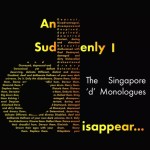“No phones, just ghosts living in the moment”
Reviewer: Lee Shu Yu
Performance: 18 May 2019
I love scrolling down the social media feeds I have carefully curated to my interests. I love recognising my online friends by their handles. My fingers probably scroll and tap in my sleep.
Depending on one’s outlook, I am what people call a digital native, or a smartphone zombie. And I have to admit, I love it.
Yet, there is nothing more satisfying than surrendering my connectivity for an hour or two at the theatre. I find myself grinning at Ghost Call’s pre-show expectation to turn our phones off. What if somebody tries contacting me? Do I turn into that blue-ticking ghoul instead?
I leave the irony at the door of Room 1 and am greeted by the sterile white room ahead. A bright-eyed Adeline (Stephanie Rae Yoong) sticks pink and blue post-its on the wall. There are greetings and questions, hopes and fears, and even a game of tic-tac-toe.
Right next door in Room 2, a furtive Evan (Matthew Goh) scribbles shyly. He keeps the notes to himself.
In and out I go between rooms at Ghost Call, written by Nabilah Said in collaboration with RAW Moves. It is a self-directed experience: audience members move about and interact with each other and the dancers. Soon, we learn from a cordial voiceover that Evan and Adeline live in Clicktopia, where the sun never sets and people are always moving. It is a cheeky jab at the internet and smartphone culture that never sleeps, and it gradually tumbles toward chaos.
At one point, Adeline dances beneath a blanket in the dark. Although I am curious about the heavy breathing coming from Evan next door, the strained beauty of her understated movement keeps me watching. A voice recording detailing modern life on social media plays softly, just barely audible.
When I return to Evan, his movement has taken a drastic turn. Possessed by a sudden desperation, he careens between audience bodies and across the space. He moves with such a powerful mix of violence, grace and discipline that I am immediately pained by the sight. The same voiceover from before has become sickening in its relentless drone.
It is then I get hit by a wave of inexplicable loneliness that I may never get to know either Evan or Adeline in full.
Ghost Call is an experience designed to elicit “FOMO” – a fear of missing out – and does so to great success. The strangeness of watching only one half of a performance amplifies the disconnection of the social media age that permeates our lives.
Between guessing the happenings in the next room, watching the dancers and other participants and feeling self-conscious in return, the sensory overload overwhelms me. Word becomes noise and bodies become spectres. I find myself floating in the limbo of fiction and reality, presence and algorithms.
It is a conceptually strong piece of work that captures the bittersweet sensations of modern communication that brings us closer in a myriad of ways, but perhaps ultimately distances us from each other.
Yet, I cannot help but feel like beyond lambasting the smartphone age, Ghost Call also laments our inherent need for validation and connection. It seems like technology did not just make ghosts of us, it simply opened the doors for our own ghosts to show themselves.
Do you have an opinion or comment about this post? Email us at info@centre42.sg.
ABOUT THE PRODUCTION
GHOST CALL by Nabilah Said
16 – 18 May 2019
Goodman Arts Centre
ABOUT THE REVIEWER
Shu Yu is a currently pursuing a degree in Theatre Studies at the National University of Singapore and loves exploring all that has to do with the arts. Her latest foray into reviewing stems from a desire to support the vibrant ecology of the arts in Singapore.





